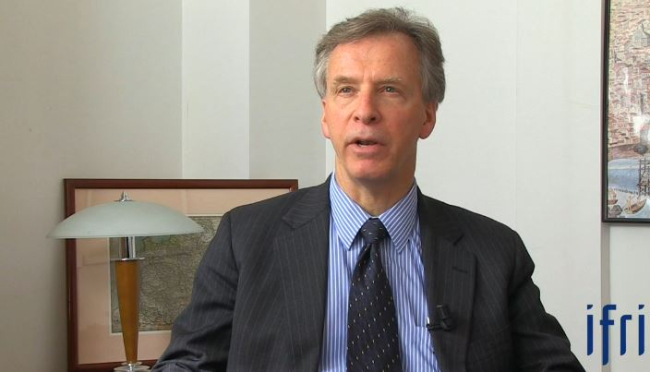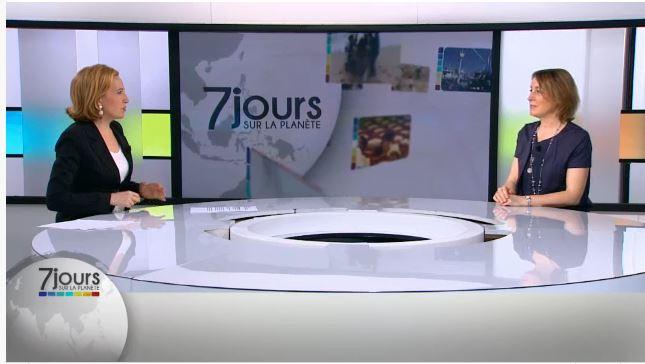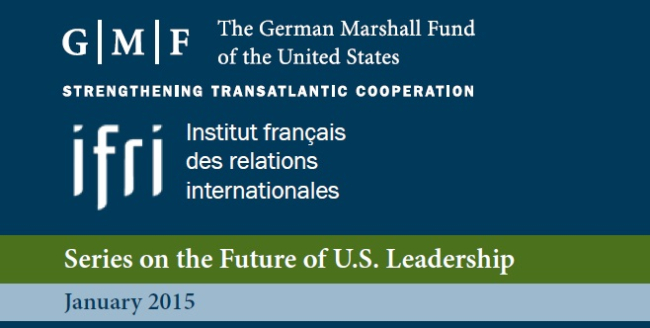MOOCs: Re-Creating Affordable Education
This piece is the thrid in a series of four Chroniques américaines on education in the United States, published this week.
Agreement on the Trans-Pacific Partnership (TPP) in Atlanta. TPP and TTIP: Power Games in the U.S. Congress
Our analysis on the Agrement on the Trans-Pacific Partnership (TPP) in Atlanta: President Obama is now seeking approval from Congress. He might be getting more support from the Republicans.
USA and the negociations with Iran 2/2 : U.S. views on the true nature of the Iranian regime
Robert Litwak from the Wilson Center joined Ifri on April 22, 2015 for a seminar on the U.S.-Iranian nuclear negotiations. In this video, he analyzes the different views on Iran and its regime.
Robert Litwak is the Vice President for Scholars and Director of International Security Studies at the Woodrow Wilson International Center for Scholars.
Où va l'École américaine ?
Many Europeans are unaware of Obama's commitment to secondary school reform. The US administration introduced administrative methods inspired by the private sector to combat poor test results in public middle and high schools with large minority populations. This approach is consistent with previous policies and should resonate with French observers.
L'échiquier numérique américain : Quelle place pour l'Europe ?
The United States has established itself as the indisputable global leader in the digital market followed by more interventionist actors such as Russia and China. Europe has fallen behind as it struggles to find its place in this crucial sector. The new European Commission must respond and provide Europe with tools to compete with the market's more dominant actors.

The United States: the Black Question
We all wanted to believe that Barack Obama's dazzling election in 2008 would accelerate history's forward trajectory in a good way for once. Barack Obama, would lead the United States into a post-racial era and serve as an example for all democracies. Six years later we see that we were wrong: the American president did not perform any of the expected miracles.
Last August in Missouri, a white police officer shot Michael Brown, a young African-American male. After courts found the officer not guilty, riots broke out in Ferguson and a number of large American cities. This anger demonstrates that 50 years after civil rights legislation race continues to deeply divide the United States. Are events in Ferguson emblematic of a larger problem? What impact will racial tensions have on American politics just two years from the next presidential election?
Historic Meeting between Obama and Raul Castro
The thaw between Cuba and the United States reaches a head at the Summit of the Americas in Panama and the normalization of relations has begun as the White House removed Cuba from the state-sponsored terrorism list. Laurence Nardon, head of the United States program at IFRI comments on U.S.-Cuba relations as well as Hillary Clinton's presidential campaign kickoff.

NSA : can Americans talk privately?
Anne Giudicelli, founder of TERR(o)RISC, Laurence Nardon, researcher and head of the United States program at IFRI, Benaouda Abdeddaïm, columnist at BFM Business and Romain Zerbib, strategic management researcher with IGS, share their thoughts on privacy as the Patriot Act expires.
Les Décodeurs de l'éco, from June 1st, hosted by Fabrice Lundy, on BFM Business.

The American Campaign
Où en est la campagne américaine ? on France Culture, with Christine Okrent
Le rôle de l'Inde de Modi dans la politique américaine en Asie
As President Obama makes an official visit to India, Martin Quencez, expert from the GMF Paris office reflects on the current administration's policy toward Asia and notably the "pivot to Asia". The celebrated Indo-American relationship does not appear to have held much promise until now. Could it grow significantly during Narenda Modi's presidency to constitute a key element of the American presence in the region?
Support independent French research
Ifri, a foundation recognized as being of public utility, relies largely on private donors – companies and individuals – to guarantee its sustainability and intellectual independence. Through their funding, donors help maintain the Institute's position among the world's leading think tanks. By benefiting from an internationally recognized network and expertise, donors refine their understanding of geopolitical risk and its consequences on global politics and the economy. In 2024, Ifri will support more than 70 French and foreign companies and organizations.












